Analysis of National and Organizational Culture: Reflective Report
VerifiedAdded on 2023/01/16
|6
|1639
|43
Report
AI Summary
This report is a reflective analysis of a previous report on national and organizational culture, exploring cultural differences between the US and Tanzania. It utilizes Hofstede's six dimensions to compare the two countries, focusing on power distance, individualism, masculinity, indulgence, uncertainty avoidance, and long-term orientation. The report also reflects on a group task, identifying strengths such as knowledge sharing and weaknesses such as time management and coordination. It emphasizes the importance of understanding cultural nuances for effective international management, especially in adapting to local values and mentalities. The author concludes by highlighting the significance of improved time management and coordination in future group tasks.
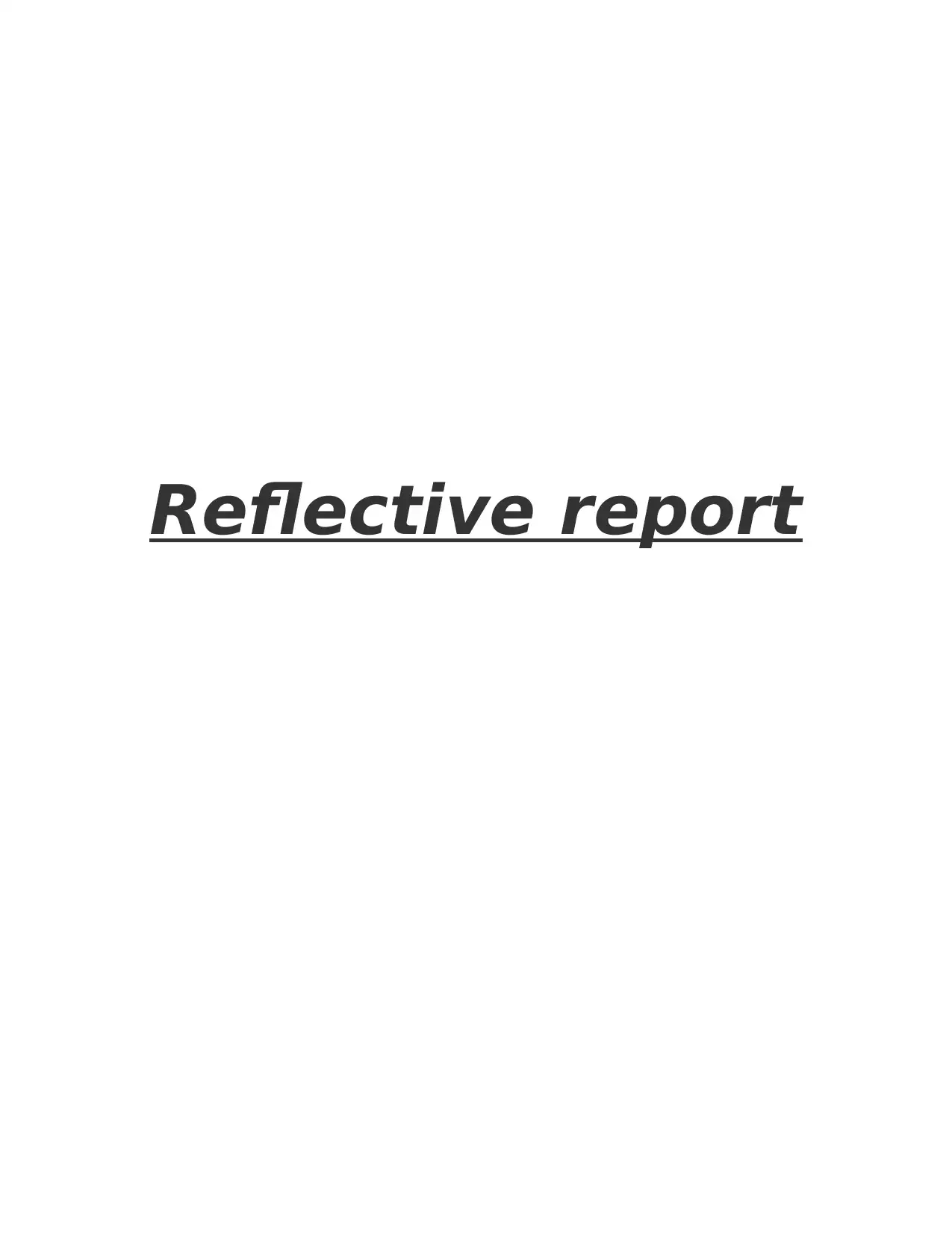
Reflective report
Paraphrase This Document
Need a fresh take? Get an instant paraphrase of this document with our AI Paraphraser
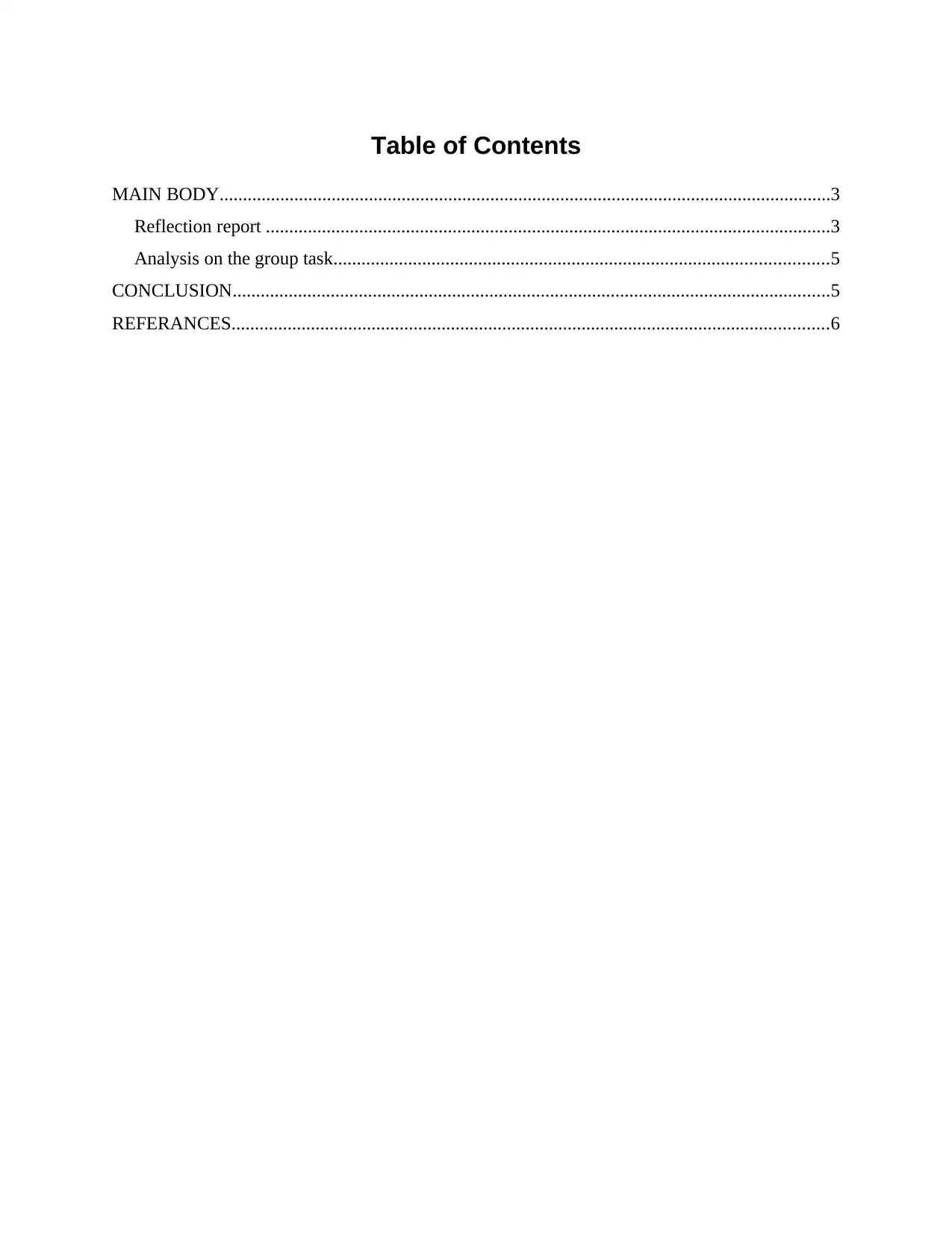
Table of Contents
MAIN BODY...................................................................................................................................3
Reflection report .........................................................................................................................3
Analysis on the group task..........................................................................................................5
CONCLUSION................................................................................................................................5
REFERANCES................................................................................................................................6
MAIN BODY...................................................................................................................................3
Reflection report .........................................................................................................................3
Analysis on the group task..........................................................................................................5
CONCLUSION................................................................................................................................5
REFERANCES................................................................................................................................6
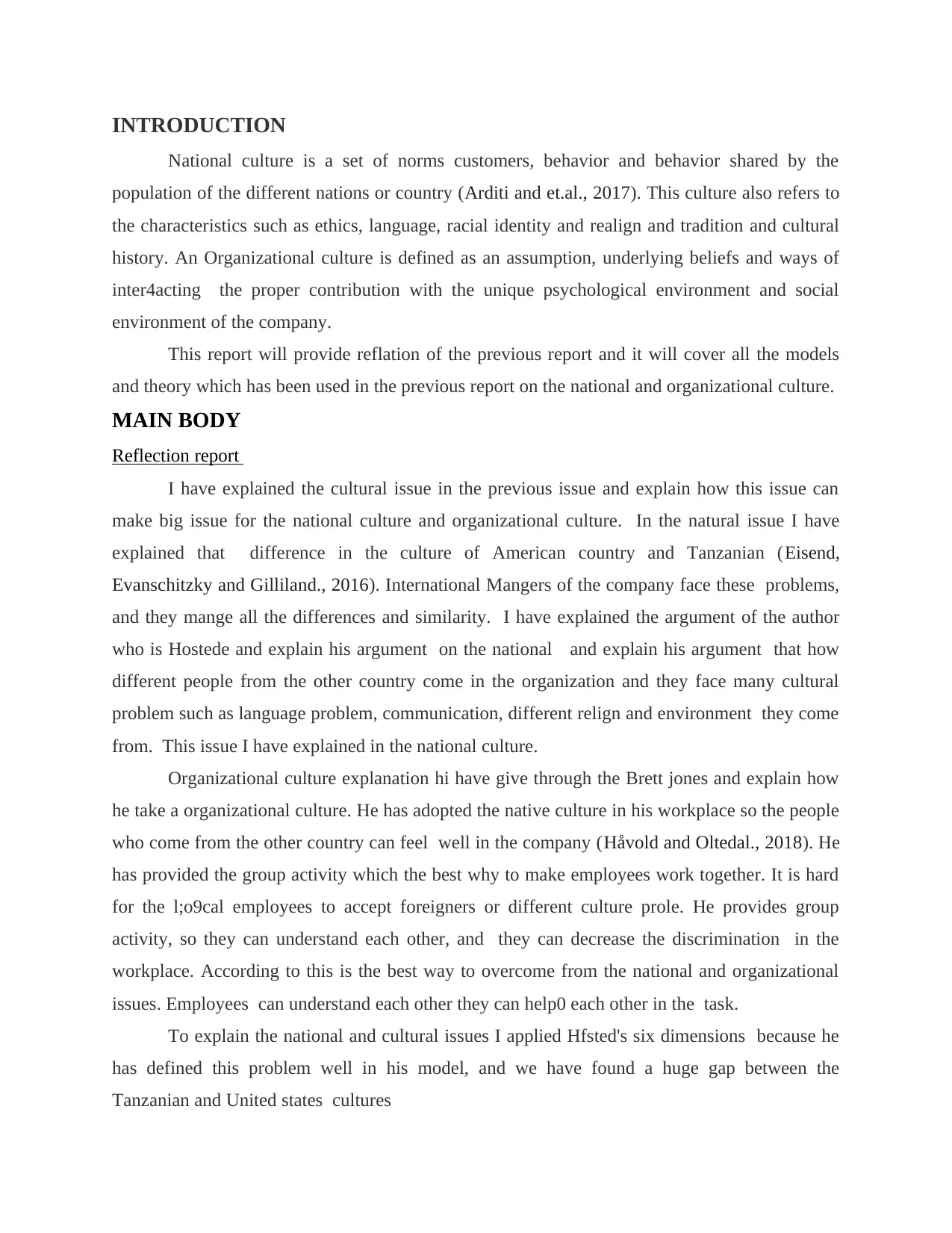
INTRODUCTION
National culture is a set of norms customers, behavior and behavior shared by the
population of the different nations or country (Arditi and et.al., 2017). This culture also refers to
the characteristics such as ethics, language, racial identity and realign and tradition and cultural
history. An Organizational culture is defined as an assumption, underlying beliefs and ways of
inter4acting the proper contribution with the unique psychological environment and social
environment of the company.
This report will provide reflation of the previous report and it will cover all the models
and theory which has been used in the previous report on the national and organizational culture.
MAIN BODY
Reflection report
I have explained the cultural issue in the previous issue and explain how this issue can
make big issue for the national culture and organizational culture. In the natural issue I have
explained that difference in the culture of American country and Tanzanian (Eisend,
Evanschitzky and Gilliland., 2016). International Mangers of the company face these problems,
and they mange all the differences and similarity. I have explained the argument of the author
who is Hostede and explain his argument on the national and explain his argument that how
different people from the other country come in the organization and they face many cultural
problem such as language problem, communication, different relign and environment they come
from. This issue I have explained in the national culture.
Organizational culture explanation hi have give through the Brett jones and explain how
he take a organizational culture. He has adopted the native culture in his workplace so the people
who come from the other country can feel well in the company (Håvold and Oltedal., 2018). He
has provided the group activity which the best why to make employees work together. It is hard
for the l;o9cal employees to accept foreigners or different culture prole. He provides group
activity, so they can understand each other, and they can decrease the discrimination in the
workplace. According to this is the best way to overcome from the national and organizational
issues. Employees can understand each other they can help0 each other in the task.
To explain the national and cultural issues I applied Hfsted's six dimensions because he
has defined this problem well in his model, and we have found a huge gap between the
Tanzanian and United states cultures
National culture is a set of norms customers, behavior and behavior shared by the
population of the different nations or country (Arditi and et.al., 2017). This culture also refers to
the characteristics such as ethics, language, racial identity and realign and tradition and cultural
history. An Organizational culture is defined as an assumption, underlying beliefs and ways of
inter4acting the proper contribution with the unique psychological environment and social
environment of the company.
This report will provide reflation of the previous report and it will cover all the models
and theory which has been used in the previous report on the national and organizational culture.
MAIN BODY
Reflection report
I have explained the cultural issue in the previous issue and explain how this issue can
make big issue for the national culture and organizational culture. In the natural issue I have
explained that difference in the culture of American country and Tanzanian (Eisend,
Evanschitzky and Gilliland., 2016). International Mangers of the company face these problems,
and they mange all the differences and similarity. I have explained the argument of the author
who is Hostede and explain his argument on the national and explain his argument that how
different people from the other country come in the organization and they face many cultural
problem such as language problem, communication, different relign and environment they come
from. This issue I have explained in the national culture.
Organizational culture explanation hi have give through the Brett jones and explain how
he take a organizational culture. He has adopted the native culture in his workplace so the people
who come from the other country can feel well in the company (Håvold and Oltedal., 2018). He
has provided the group activity which the best why to make employees work together. It is hard
for the l;o9cal employees to accept foreigners or different culture prole. He provides group
activity, so they can understand each other, and they can decrease the discrimination in the
workplace. According to this is the best way to overcome from the national and organizational
issues. Employees can understand each other they can help0 each other in the task.
To explain the national and cultural issues I applied Hfsted's six dimensions because he
has defined this problem well in his model, and we have found a huge gap between the
Tanzanian and United states cultures
⊘ This is a preview!⊘
Do you want full access?
Subscribe today to unlock all pages.

Trusted by 1+ million students worldwide
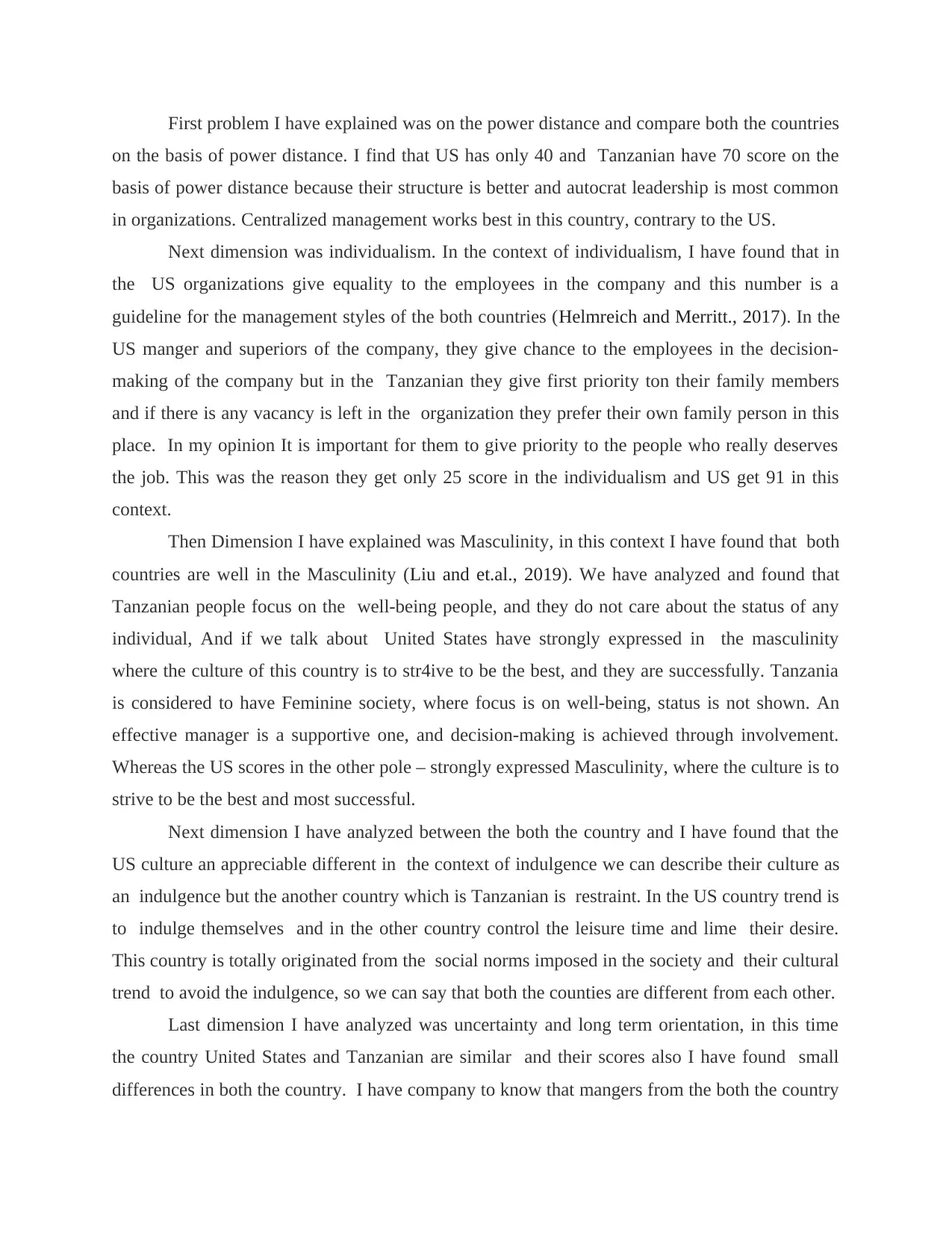
First problem I have explained was on the power distance and compare both the countries
on the basis of power distance. I find that US has only 40 and Tanzanian have 70 score on the
basis of power distance because their structure is better and autocrat leadership is most common
in organizations. Centralized management works best in this country, contrary to the US.
Next dimension was individualism. In the context of individualism, I have found that in
the US organizations give equality to the employees in the company and this number is a
guideline for the management styles of the both countries (Helmreich and Merritt., 2017). In the
US manger and superiors of the company, they give chance to the employees in the decision-
making of the company but in the Tanzanian they give first priority ton their family members
and if there is any vacancy is left in the organization they prefer their own family person in this
place. In my opinion It is important for them to give priority to the people who really deserves
the job. This was the reason they get only 25 score in the individualism and US get 91 in this
context.
Then Dimension I have explained was Masculinity, in this context I have found that both
countries are well in the Masculinity (Liu and et.al., 2019). We have analyzed and found that
Tanzanian people focus on the well-being people, and they do not care about the status of any
individual, And if we talk about United States have strongly expressed in the masculinity
where the culture of this country is to str4ive to be the best, and they are successfully. Tanzania
is considered to have Feminine society, where focus is on well-being, status is not shown. An
effective manager is a supportive one, and decision-making is achieved through involvement.
Whereas the US scores in the other pole – strongly expressed Masculinity, where the culture is to
strive to be the best and most successful.
Next dimension I have analyzed between the both the country and I have found that the
US culture an appreciable different in the context of indulgence we can describe their culture as
an indulgence but the another country which is Tanzanian is restraint. In the US country trend is
to indulge themselves and in the other country control the leisure time and lime their desire.
This country is totally originated from the social norms imposed in the society and their cultural
trend to avoid the indulgence, so we can say that both the counties are different from each other.
Last dimension I have analyzed was uncertainty and long term orientation, in this time
the country United States and Tanzanian are similar and their scores also I have found small
differences in both the country. I have company to know that mangers from the both the country
on the basis of power distance. I find that US has only 40 and Tanzanian have 70 score on the
basis of power distance because their structure is better and autocrat leadership is most common
in organizations. Centralized management works best in this country, contrary to the US.
Next dimension was individualism. In the context of individualism, I have found that in
the US organizations give equality to the employees in the company and this number is a
guideline for the management styles of the both countries (Helmreich and Merritt., 2017). In the
US manger and superiors of the company, they give chance to the employees in the decision-
making of the company but in the Tanzanian they give first priority ton their family members
and if there is any vacancy is left in the organization they prefer their own family person in this
place. In my opinion It is important for them to give priority to the people who really deserves
the job. This was the reason they get only 25 score in the individualism and US get 91 in this
context.
Then Dimension I have explained was Masculinity, in this context I have found that both
countries are well in the Masculinity (Liu and et.al., 2019). We have analyzed and found that
Tanzanian people focus on the well-being people, and they do not care about the status of any
individual, And if we talk about United States have strongly expressed in the masculinity
where the culture of this country is to str4ive to be the best, and they are successfully. Tanzania
is considered to have Feminine society, where focus is on well-being, status is not shown. An
effective manager is a supportive one, and decision-making is achieved through involvement.
Whereas the US scores in the other pole – strongly expressed Masculinity, where the culture is to
strive to be the best and most successful.
Next dimension I have analyzed between the both the country and I have found that the
US culture an appreciable different in the context of indulgence we can describe their culture as
an indulgence but the another country which is Tanzanian is restraint. In the US country trend is
to indulge themselves and in the other country control the leisure time and lime their desire.
This country is totally originated from the social norms imposed in the society and their cultural
trend to avoid the indulgence, so we can say that both the counties are different from each other.
Last dimension I have analyzed was uncertainty and long term orientation, in this time
the country United States and Tanzanian are similar and their scores also I have found small
differences in both the country. I have company to know that mangers from the both the country
Paraphrase This Document
Need a fresh take? Get an instant paraphrase of this document with our AI Paraphraser
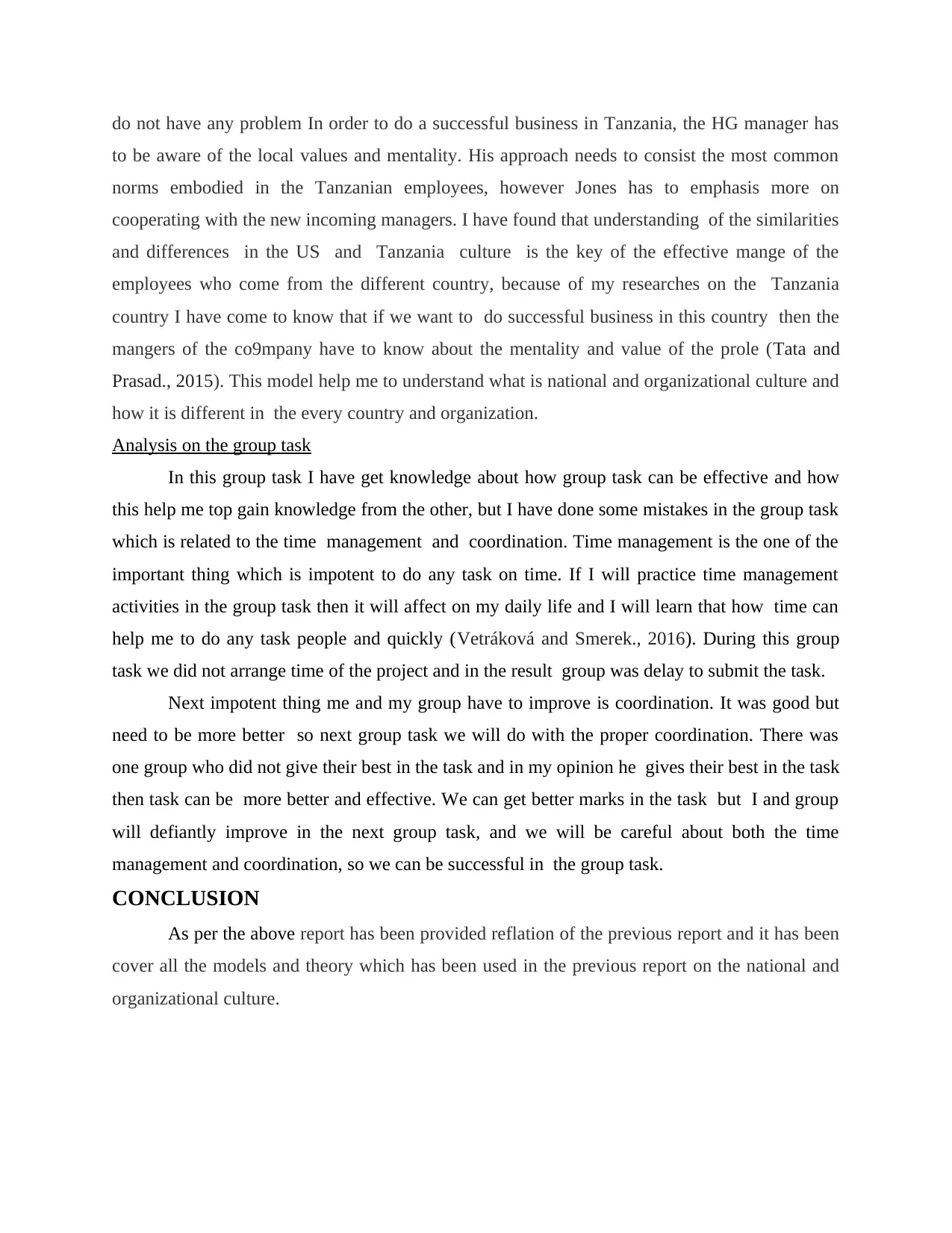
do not have any problem In order to do a successful business in Tanzania, the HG manager has
to be aware of the local values and mentality. His approach needs to consist the most common
norms embodied in the Tanzanian employees, however Jones has to emphasis more on
cooperating with the new incoming managers. I have found that understanding of the similarities
and differences in the US and Tanzania culture is the key of the effective mange of the
employees who come from the different country, because of my researches on the Tanzania
country I have come to know that if we want to do successful business in this country then the
mangers of the co9mpany have to know about the mentality and value of the prole (Tata and
Prasad., 2015). This model help me to understand what is national and organizational culture and
how it is different in the every country and organization.
Analysis on the group task
In this group task I have get knowledge about how group task can be effective and how
this help me top gain knowledge from the other, but I have done some mistakes in the group task
which is related to the time management and coordination. Time management is the one of the
important thing which is impotent to do any task on time. If I will practice time management
activities in the group task then it will affect on my daily life and I will learn that how time can
help me to do any task people and quickly (Vetráková and Smerek., 2016). During this group
task we did not arrange time of the project and in the result group was delay to submit the task.
Next impotent thing me and my group have to improve is coordination. It was good but
need to be more better so next group task we will do with the proper coordination. There was
one group who did not give their best in the task and in my opinion he gives their best in the task
then task can be more better and effective. We can get better marks in the task but I and group
will defiantly improve in the next group task, and we will be careful about both the time
management and coordination, so we can be successful in the group task.
CONCLUSION
As per the above report has been provided reflation of the previous report and it has been
cover all the models and theory which has been used in the previous report on the national and
organizational culture.
to be aware of the local values and mentality. His approach needs to consist the most common
norms embodied in the Tanzanian employees, however Jones has to emphasis more on
cooperating with the new incoming managers. I have found that understanding of the similarities
and differences in the US and Tanzania culture is the key of the effective mange of the
employees who come from the different country, because of my researches on the Tanzania
country I have come to know that if we want to do successful business in this country then the
mangers of the co9mpany have to know about the mentality and value of the prole (Tata and
Prasad., 2015). This model help me to understand what is national and organizational culture and
how it is different in the every country and organization.
Analysis on the group task
In this group task I have get knowledge about how group task can be effective and how
this help me top gain knowledge from the other, but I have done some mistakes in the group task
which is related to the time management and coordination. Time management is the one of the
important thing which is impotent to do any task on time. If I will practice time management
activities in the group task then it will affect on my daily life and I will learn that how time can
help me to do any task people and quickly (Vetráková and Smerek., 2016). During this group
task we did not arrange time of the project and in the result group was delay to submit the task.
Next impotent thing me and my group have to improve is coordination. It was good but
need to be more better so next group task we will do with the proper coordination. There was
one group who did not give their best in the task and in my opinion he gives their best in the task
then task can be more better and effective. We can get better marks in the task but I and group
will defiantly improve in the next group task, and we will be careful about both the time
management and coordination, so we can be successful in the group task.
CONCLUSION
As per the above report has been provided reflation of the previous report and it has been
cover all the models and theory which has been used in the previous report on the national and
organizational culture.
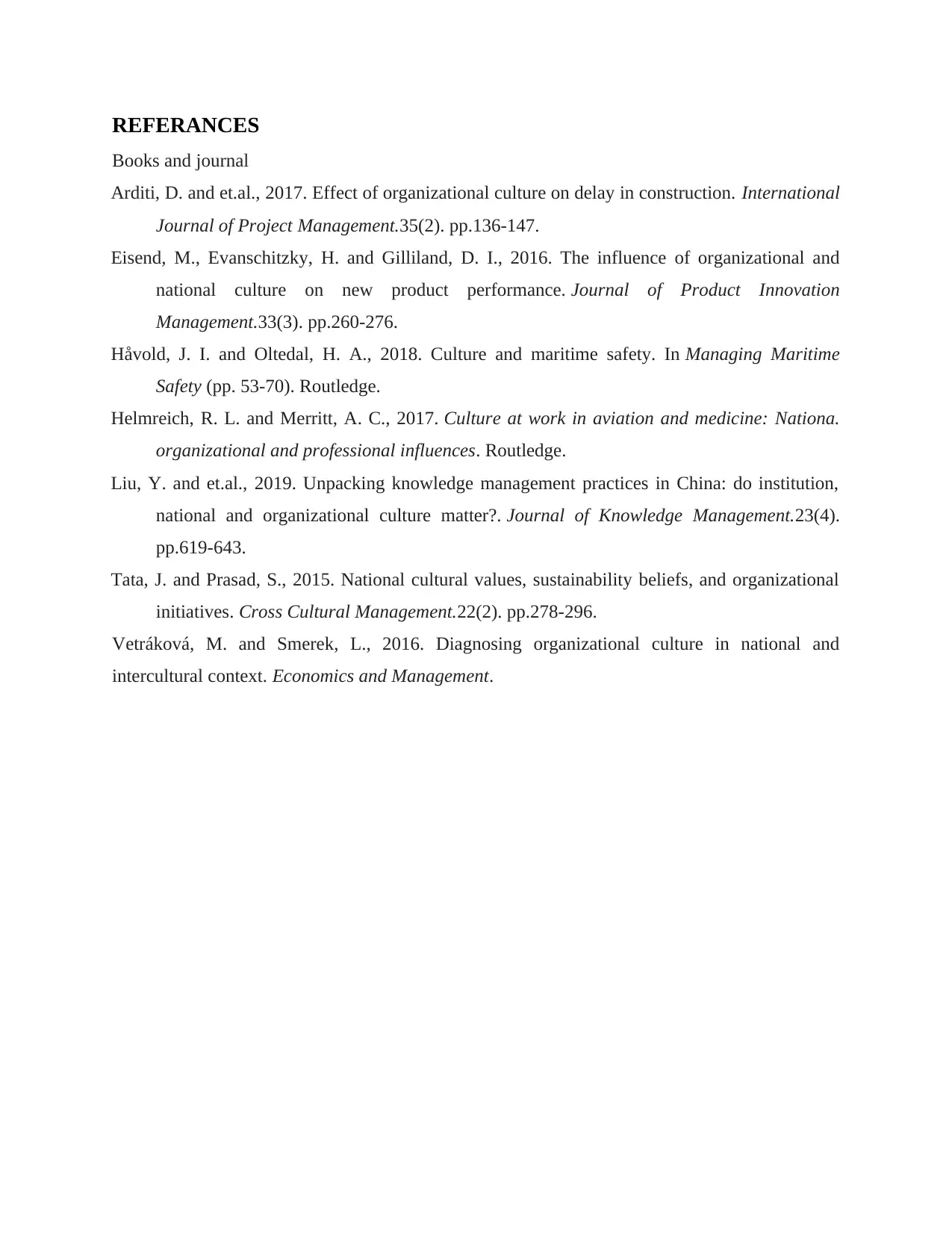
REFERANCES
Books and journal
Arditi, D. and et.al., 2017. Effect of organizational culture on delay in construction. International
Journal of Project Management.35(2). pp.136-147.
Eisend, M., Evanschitzky, H. and Gilliland, D. I., 2016. The influence of organizational and
national culture on new product performance. Journal of Product Innovation
Management.33(3). pp.260-276.
Håvold, J. I. and Oltedal, H. A., 2018. Culture and maritime safety. In Managing Maritime
Safety (pp. 53-70). Routledge.
Helmreich, R. L. and Merritt, A. C., 2017. Culture at work in aviation and medicine: Nationa.
organizational and professional influences. Routledge.
Liu, Y. and et.al., 2019. Unpacking knowledge management practices in China: do institution,
national and organizational culture matter?. Journal of Knowledge Management.23(4).
pp.619-643.
Tata, J. and Prasad, S., 2015. National cultural values, sustainability beliefs, and organizational
initiatives. Cross Cultural Management.22(2). pp.278-296.
Vetráková, M. and Smerek, L., 2016. Diagnosing organizational culture in national and
intercultural context. Economics and Management.
Books and journal
Arditi, D. and et.al., 2017. Effect of organizational culture on delay in construction. International
Journal of Project Management.35(2). pp.136-147.
Eisend, M., Evanschitzky, H. and Gilliland, D. I., 2016. The influence of organizational and
national culture on new product performance. Journal of Product Innovation
Management.33(3). pp.260-276.
Håvold, J. I. and Oltedal, H. A., 2018. Culture and maritime safety. In Managing Maritime
Safety (pp. 53-70). Routledge.
Helmreich, R. L. and Merritt, A. C., 2017. Culture at work in aviation and medicine: Nationa.
organizational and professional influences. Routledge.
Liu, Y. and et.al., 2019. Unpacking knowledge management practices in China: do institution,
national and organizational culture matter?. Journal of Knowledge Management.23(4).
pp.619-643.
Tata, J. and Prasad, S., 2015. National cultural values, sustainability beliefs, and organizational
initiatives. Cross Cultural Management.22(2). pp.278-296.
Vetráková, M. and Smerek, L., 2016. Diagnosing organizational culture in national and
intercultural context. Economics and Management.
⊘ This is a preview!⊘
Do you want full access?
Subscribe today to unlock all pages.

Trusted by 1+ million students worldwide
1 out of 6
Related Documents
Your All-in-One AI-Powered Toolkit for Academic Success.
+13062052269
info@desklib.com
Available 24*7 on WhatsApp / Email
![[object Object]](/_next/static/media/star-bottom.7253800d.svg)
Unlock your academic potential
Copyright © 2020–2026 A2Z Services. All Rights Reserved. Developed and managed by ZUCOL.



